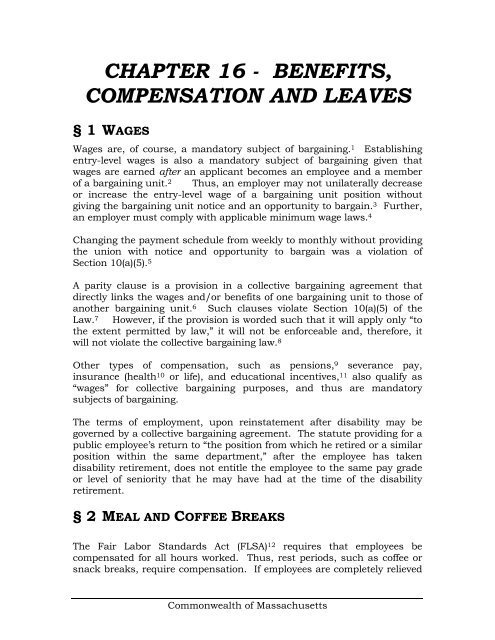Management Rights - AELE's Home Page
Management Rights - AELE's Home Page
Management Rights - AELE's Home Page
Create successful ePaper yourself
Turn your PDF publications into a flip-book with our unique Google optimized e-Paper software.
CHAPTER 16 - BENEFITS,<br />
COMPENSATION AND LEAVES<br />
§ 1 WAGES<br />
Wages are, of course, a mandatory subject of bargaining. 1 Establishing<br />
entry-level wages is also a mandatory subject of bargaining given that<br />
wages are earned after an applicant becomes an employee and a member<br />
of a bargaining unit. 2 Thus, an employer may not unilaterally decrease<br />
or increase the entry-level wage of a bargaining unit position without<br />
giving the bargaining unit notice and an opportunity to bargain. 3 Further,<br />
an employer must comply with applicable minimum wage laws. 4<br />
Changing the payment schedule from weekly to monthly without providing<br />
the union with notice and opportunity to bargain was a violation of<br />
Section 10(a)(5). 5<br />
A parity clause is a provision in a collective bargaining agreement that<br />
directly links the wages and/or benefits of one bargaining unit to those of<br />
another bargaining unit. 6 Such clauses violate Section 10(a)(5) of the<br />
Law. 7 However, if the provision is worded such that it wil apply only “to<br />
the extent permited by law,” it wil not be enforceable and, therefore, it<br />
will not violate the collective bargaining law. 8<br />
Other types of compensation, such as pensions, 9 severance pay,<br />
insurance (health 10 or life), and educational incentives, 11 also qualify as<br />
“wages” for colective bargaining purposes, and thus are mandatory<br />
subjects of bargaining.<br />
The terms of employment, upon reinstatement after disability may be<br />
governed by a collective bargaining agreement. The statute providing for a<br />
public employee’s return to “the position from which he retired or a similar<br />
position within the same department,” after the employee has taken<br />
disability retirement, does not entitle the employee to the same pay grade<br />
or level of seniority that he may have had at the time of the disability<br />
retirement.<br />
§ 2 MEAL AND COFFEE BREAKS<br />
The Fair Labor Standards Act (FLSA) 12 requires that employees be<br />
compensated for all hours worked. Thus, rest periods, such as coffee or<br />
snack breaks, require compensation. If employees are completely relieved<br />
Commonwealth of Massachusetts
















